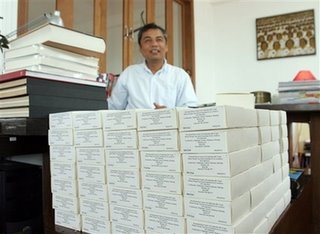 Youk Chhang, director of the Documentation Center of Cambodia, an independent group researching the Khmer Rouge crimes, stands behind boxes of microfilms containing documents about Khmer Rouge atrocities at his office in Phnom Penh, Cambodia, Monday, July 17, 2006. On Tuesday, he said he has turned over more than 380,000 pages of Khmer Rouge documents that detail torture and other atrocities to a U.N.-backed tribunal to help it build cases for trying the former Cambodian regime's surviving leaders. (AP Photo/Heng Sinith)
Youk Chhang, director of the Documentation Center of Cambodia, an independent group researching the Khmer Rouge crimes, stands behind boxes of microfilms containing documents about Khmer Rouge atrocities at his office in Phnom Penh, Cambodia, Monday, July 17, 2006. On Tuesday, he said he has turned over more than 380,000 pages of Khmer Rouge documents that detail torture and other atrocities to a U.N.-backed tribunal to help it build cases for trying the former Cambodian regime's surviving leaders. (AP Photo/Heng Sinith)(Kyodo) - A joint Cambodia-U.N. tribunal established to bring former Khmer Rouge leaders to justice has received a large amount of documents from a local genocide research center that will be studied for use by prosecutors, a tribunal spokesman said Tuesday.
Reach Sambath, spokesman for Extraordinary Chambers in the Courts of Cambodia, told Kyodo News that the tribunal received the "useful" documents Monday from the Documentation Center of Cambodia and that co-prosecutors will decide "which to be used and of which not to be used."
Chhang Youk, director of the center, confirmed it provided 383,149 pages of documents that were condensed and copied onto 524 rolls of microfilm.
They constitute the majority of the center's collections of information relating to genocide and crimes against humanity committed during the 1975-1979 Khmer Rouge regime, during which time it is estimated at least 1.7 million Cambodians died or were killed.
Since 1995, Chhang Youk and his dozens of staff have collected 600,000 pages of prisoner confessions, telegrams, minutes of meetings and memos, along with maps of some 20,000 mass grave sites, 189 prisons and 80 memorials.
The center also has amassed 6,000 photographs from the era, 200 documentary films and 4,000 transcribed interviews with former Khmer Rouge soldiers. ADVERTISEMENT
Reach Sambath said the documents are now in the hands of the co-prosecutors, who will "work on those documents seriously."
"We will not rely on one source, but on many. We welcome any sources available," he said.
While the court is moving toward a trial of former Khmer Rouge leaders, they are elderly and some of them are sick.
Ta Mok, 80, the former military leader, is now hospitalized in critical condition. His lawyer Benson Samay has said his client may die before he can be tried by the tribunal.
Ta Mok is believed to be one of the prime suspects for the tribunal along with other three surviving leaders: Ieng Sary, Khieu Samphan and Nuon Chea.
Reach Sambath, spokesman for Extraordinary Chambers in the Courts of Cambodia, told Kyodo News that the tribunal received the "useful" documents Monday from the Documentation Center of Cambodia and that co-prosecutors will decide "which to be used and of which not to be used."
Chhang Youk, director of the center, confirmed it provided 383,149 pages of documents that were condensed and copied onto 524 rolls of microfilm.
They constitute the majority of the center's collections of information relating to genocide and crimes against humanity committed during the 1975-1979 Khmer Rouge regime, during which time it is estimated at least 1.7 million Cambodians died or were killed.
Since 1995, Chhang Youk and his dozens of staff have collected 600,000 pages of prisoner confessions, telegrams, minutes of meetings and memos, along with maps of some 20,000 mass grave sites, 189 prisons and 80 memorials.
The center also has amassed 6,000 photographs from the era, 200 documentary films and 4,000 transcribed interviews with former Khmer Rouge soldiers. ADVERTISEMENT
Reach Sambath said the documents are now in the hands of the co-prosecutors, who will "work on those documents seriously."
"We will not rely on one source, but on many. We welcome any sources available," he said.
While the court is moving toward a trial of former Khmer Rouge leaders, they are elderly and some of them are sick.
Ta Mok, 80, the former military leader, is now hospitalized in critical condition. His lawyer Benson Samay has said his client may die before he can be tried by the tribunal.
Ta Mok is believed to be one of the prime suspects for the tribunal along with other three surviving leaders: Ieng Sary, Khieu Samphan and Nuon Chea.

























No comments:
Post a Comment